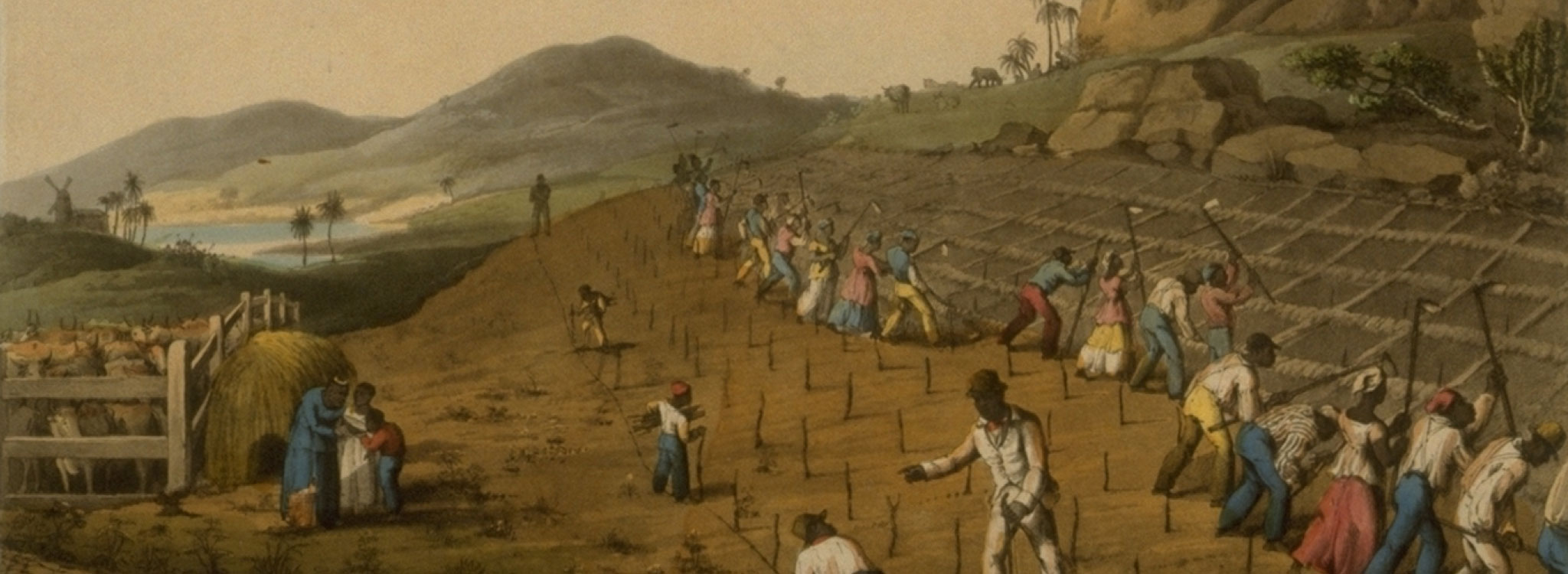Garlic, Delia (c. 1837 - ?) was a former slave who recounted her story in a 1937 interview with the Federal Writers' Project (FWP) in Fruithurst, Alabama. During the Great Depression, between 1936 and 1938, the Works Project Administration (WPA) sent unemployed writers across the country to interview ordinary people and record their life histories. After the initial phase, John A. Lomax, the National Advisor on Folklore and Folkways for the FWP, was struck by the ex-slave interviews and in 1937 sent out writers to seek out former slaves. Garlic's interview was conducted during this phase and stands out as a record of life under slavery; many consider her account to be one of the most critical recorded during the FWP project. Unlike others, Garlic did not speakly with fondness about the slave era, instead stating plainly: "Dem days wuz hell."
Claiming to be one hundred years old at the time of her interview, Garlic was the youngest of thirteen children born to a slave woman in Powhatan, Virginia sometime around 1837. She never knew eleven of her siblings or her father, being taken by slave speculators as an infant, along with her mother and brother William, to Richmond, Virginia to be sold at auction. Delia and her mother were sold to a Henrico County sheriff named Carter, while William was sold to another buyer and never seen by his mother or sister ever again. When the FWP interviewer asked if children cried during the auctions, Garlic responded directly: "Course dey cry; you think dey do not cry when dey was sold like cattle? I could tell you 'bout it all day, but even den you couldn't guess the awfulness of it."
In her interview, Garlic also detailed the quotidian experiences of household slaves. Caring for her master's granddaughter, the child hurt its hand and began crying, which caused the child's mother to "pick up a hot iron and run it all down my arm and han'. It took off the flesh when she done it." When Carter remarried, his new wife also abused Garlic for mimicking her makeup by darkening her eyebrows. When the master's new wife saw what Garlic had done, she yelled, "You black devil, I'll show you how to mock your bettes" and picked up a stick of firewood and hit her upside the head. Delia attempted to run away after Carter threatened to have an overseer "beat some sense in her", but returned to the home where a speculator was waiting to take her to be sold again. At 100 years old, she still remembered her last moments with her mother, saying,"She pressed my han' in both of hers an' said: 'Be good an' trus' in de Lawd." In her interview, Garlic reflected on the role of hope for slaves. "Trustin' was de only hope of de pore black critters in dem days. Us jest prayed for strength to endure it to de end. We didn't 'spect nothin' but to stay in bondage till we died."
After being taken from Carter's home, Garlic was sold first to a hotelier in McDonough, Georgia, then a businessman in Atlanta and later to a planter named Garlic in Louisiana. On Garlic's farm, she worked as a field hand, "plowin' an' hoein' an' choppin' cotton." On his farm, Garlic said she "didn't know nothin' 'cept to work." Waking at 3:00 or 4:00 in the morning, she ate a piece of cornbread for breakfast and supper and boiled greens, beans, and peas for dinner. Although this was a typical meal plan for slaves, others were able to supplement these diets with vegetables they grew themselves, Garlic noted that her owners provided her with "no way to cook, nor nothin' to cook in our cabins."
Before the Civil War, Garlic married a man from another plantation named Chatfield but never saw him again after he was forced into service for the Confederates in 1861. Later, she married a man on her plantation named Miles Garlic. When the War ended, Garlic remembered that "everybody wanted to git out." After the birth of her second child, she moved to Alabama to raise her family, first in Wetumpka and later to Montgomery. Very little was discussed by Garlic and the interviewer about her life between this time and the time of the interview. At the time of the interview, although living in the depth of the Great Depression, she told the interviewer that she was "eatin' white bread now an' havin' de best time of my life." She also explained that she was ready to die and "when de Lawd say, 'Delia, well done; come up higher,' I'll be glad to go."
Read the full, original biography by Steven J. Niven in the African American National Biography
Online Resources
Born in Slavery: Slave Narratives from the Federal Writers' Project, 1936 to 1938: https://www.loc.gov/collections/slave-narratives-from-the-federal-writers-project-1936-to-1938/about-this-collection/
"Delia Garlic, Montgomery Alabama" Narrative: https://www.loc.gov/resource/mesn.010/?sp=135
Bibliography
Adams, Kenneth Alan. "Psychohistory and Family Among Antebellum Slaveholders." The Journal of Psychohistory 43, 3 (2016): 167-86.
Botkin, B.A., ed., Lay My Burden Down: A Folk History of Slavery. Chicago: University of Chicago Press, 1945.
Laurie, Anna. "Of Broken Bonds and Bondage: An Analysis of Loss in the Slave Narrative Collection." Death Studies 34, no. 3 (2010): 221-56.
Pargas, Damian Alan. "The Gathering Storm: Slave Responses to the Threat of Interregional Migration in the Early Nineteenth Century." Journal of Early American History 2 (3) (2012): 286-315.
Shaw, Stephanie J. "Using the WPA ex-slave narratives to study the impact of the Great Depression." The Journal of Southern History 69, no. 3 (2003): 623-58.
Stewart, Catherine A. Long Past Slavery: Race and the Federal Writers' Ex-Slave Project during the New Deal. Chapel Hill: University of North Carolina Press, 2016.
Author
Steven J. Niven
Adapted by
Elizabeth Timbs and David Glovsky
Contributing Institutions
Hutchins Center for African & African American Research, Harvard University, Cambridge, MA.
Oxford University Press (USA) African American Studies Center.






